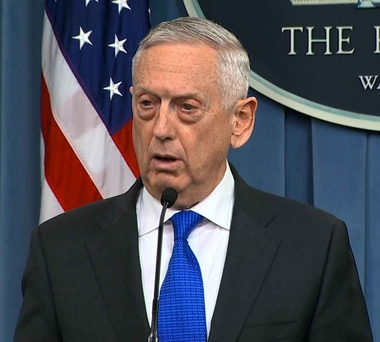James Mattis' warning to America

Secretary of Defense James Mattis is stepping down at an extraordinarily fraught moment in American foreign policy. Coming in the wake of President Trump's surprise decision to withdraw troops from Syria, without having consulted allies and after barely talking to his own national security advisers, Secretary Mattis becomes the latest "adult in the room" to leave.
The resignation takes place at a moment of great risk for the United States and its allies. The President is heading into a tumultuous period at home, which can trigger him to make even more impulsive decisions abroad. Democrats are about to take over the House, the President is facing multiple investigations -- all of which are producing some very serious accusations -- and his national approval ratings remain low. Even though Republicans are still standing by their man, the President is being boxed into a corner. That's when he can be most dangerous.
The big risk is that the President unleashes on his opponents by moving forward on some of the most radical ideas that have floated in his head, or that he proves that he is in charge by taking big, dramatic actions. That he might just allow the shutdown of the federal government, or make foreign policy based on whims and emotion rather than strategic planning. Perhaps, some fear, he will unleash military force to demonstrate that he is the commander in chief.
Very often President Trump's defenders have assured the public that they don't need to worry. With regard to foreign policy, they say that he is mostly bluster. Although his critics say that he risks undertaking a radical departure on foreign policy, some keep saying that he can be controlled and that in practice he knows what he is doing.
Yet the Mattis resignation letter, written by someone deep inside the cabinet, suggests that the critics have been right along. Stepping down from his job on the basis that someone else would be better able to fulfill Trump's vision, Mattis makes two warnings. The first is that the strength of the United States is "inextricably linked" to the "strength of our unique and comprehensive system of alliances and partnerships." Without those strong alliances, he says, the United States cannot protect itself and other key nations.
Moreover, Mattis issued a stern warning that the President has to be "resolute and unambiguous in our approach to those countries whose strategic interests are increasingly in tension with ours," pointing to China and Russia as countries that want to promote an "authoritarian model" of government to their neighbors.
Mattis' letter is not a warning to President Trump, who, he knows after so many months of close experience, won't change. Mattis understands what this President is all about and that the notion of bringing him to normalcy is a fool's errand.
This letter is not written to him. It is written to other Republicans and conservative national security policymakers who have remained silent during the tumult of the first two years. It is a letter to people who understand the history and complexities of foreign policy, to suggest that the President is not in fact on the same page as many of them. It is a message to say, very clearly, that the United States faces a real risk right now from a President who governs off of his prejudices and impulses, and who is putting at risk some of the core principles that have successfully kept us at peace.
While it is clear that President Trump will probably toss this letter into the Oval Office trash, the real question is whether anyone else in the GOP will listen to what Mattis is saying -- or whether they will continue to close their eyes and hold their ears, hoping that everything will be OK in the end.
By Julian Zelizer, CNN Political Analyst. The-CNN-Wire™ & © 2018 Cable News Network, Inc., a Time Warner Company. All rights reserved.
The Gayly – December 21, 2018 @ 7:25 a.m. CST.





